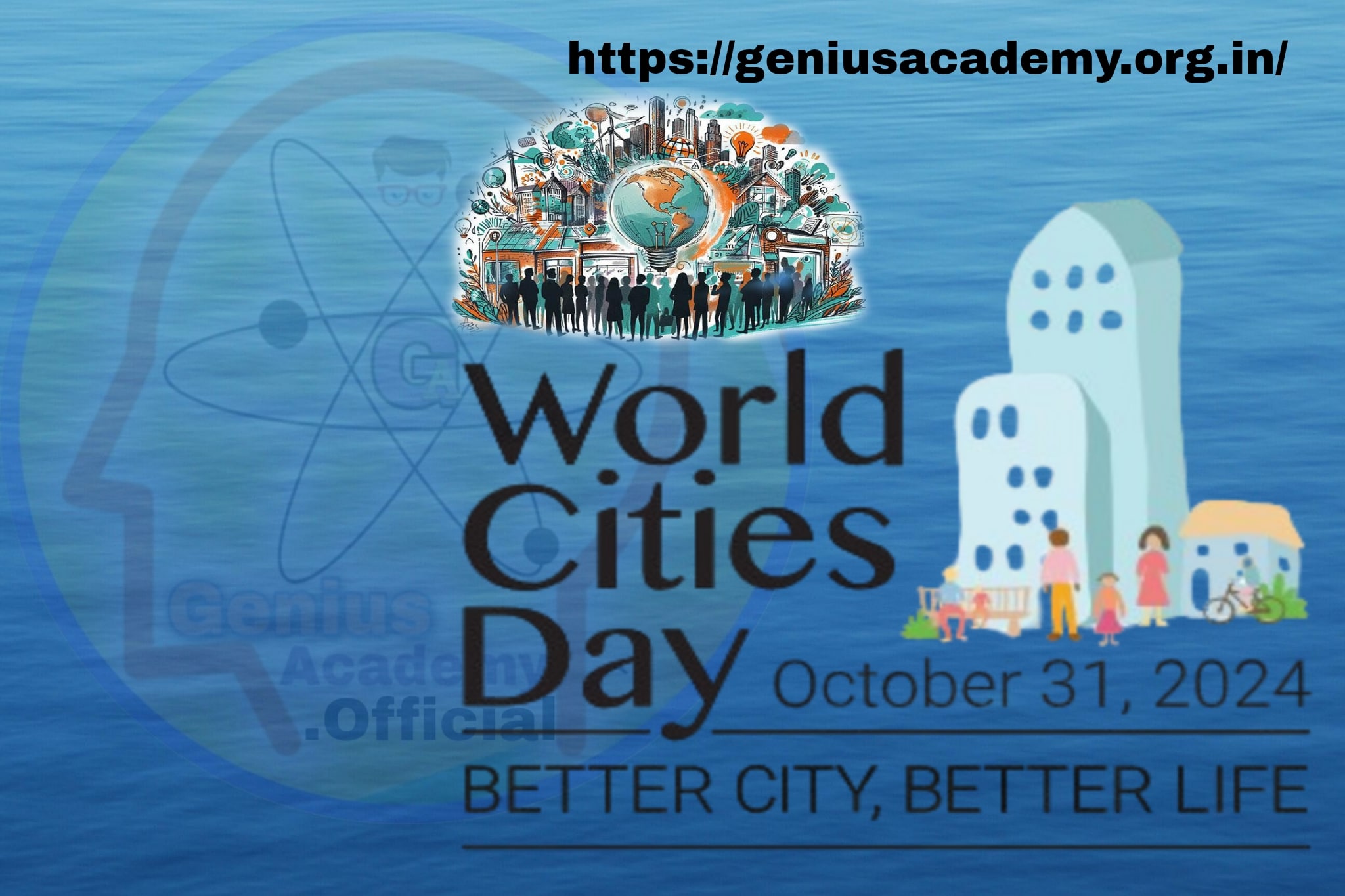
World Cities Day 2024
Cities and Climate Change: A Glimpse into Urban Sustainability and Youth Empowerment
As global urbanization continues at a rapid pace, projections indicate that by 2050, cities will house nearly 70% of the world’s population. By 2030, 60% of the population will reside in urban areas, with a significant proportion of these urban dwellers—up to 60%—being under the age of 18. This urban shift presents both opportunities and challenges, particularly in the context of climate change and sustainable development. While cities have made strides toward achieving Sustainable Development Goals (SDGs), they continue to face persistent issues like poverty, inequality, and environmental degradation, especially in regions within the Global South. These challenges demand urgent action and innovative solutions.
Celebrated annually on October 31, World Cities Day highlights both the achievements of urbanization and the challenges that accompany rapid urban growth. Launched by the United Nations General Assembly in 2013, this day aligns with Sustainable Development Goal 11 (SDG 11), which envisions cities that are inclusive, safe, resilient, and sustainable. The celebration seeks to spark global dialogue on sustainable urban development, encourage knowledge exchange, and build partnerships to address shared challenges cities face worldwide.
History and Evolution of World Cities Day
World Cities Day was officially established by UN General Assembly Resolution 68/239 in December 2013, with the inaugural celebration in 2014 in Shanghai, China. Alongside this initiative, UN-Habitat introduced “Urban October,” a month-long observance dedicated to raising awareness of urbanization’s impact and promoting the New Urban Agenda. This agenda, formalized in 2016 during the World Cities Day celebrations in Quito, Ecuador, sets out principles and actions to achieve sustainable urbanization, addressing housing, social equity, environmental quality, and economic growth.
Involving Youth in Urban Development
Experts highlight the need to actively engage youth in urban decision-making processes. Young people are vital agents of change, bringing fresh perspectives, creativity, and a drive for sustainability that can help shape the future of cities. Recognizing this, World Cities Day 2024 is dedicated to the theme “Youth Climate Changemakers: Catalyzing Local Action for Urban Sustainability.” This year’s event emphasizes the role of young people and local governments in addressing urban climate challenges, encouraging youth-led initiatives that can be scaled up to contribute meaningfully to sustainability goals.
Each year, World Cities Day builds upon its overarching theme, Better City, Better Life, with a unique sub-theme.
Global Initiatives to Elevate Youth Voices
Several international efforts are underway to amplify youth voices in urban sustainability:
- Pact for the Future and Declaration on Future Generations: These initiatives aim to prioritize youth perspectives in creating sustainable urban spaces that cater to the needs of current and future generations.
- Summit of the Future: This gathering was an essential platform for integrating youth viewpoints into global policy, reinforcing the commitment of the multilateral system to address the needs of younger generations.
Proposed Actions for Youth Engagement
To foster youth involvement, experts recommend several actionable steps:—
- Establish Youth Councils:— Creating dedicated councils allows young people to participate in urban planning discussions, ensuring that their insights are considered in policy formulation.
- Integrate Youth Representatives into Local Government:— Including youth representatives in municipal governments provides them with direct influence over policies that impact urban development and climate action.
- Facilitate Ongoing Dialogue:— Regular interactions between policymakers and youth can maintain open lines of communication, encouraging a flow of ideas that benefit both urban planners and young citizens.
These strategies aim to create cities that are sustainable, resilient, and reflective of diverse voices. By involving youth and prioritizing their input, urban areas can be better equipped to meet the challenges of climate change while creating inclusive environments that cater to the needs of all residents—now and in the future.
Significance of World Cities Day
World Cities Day is significant for several reasons:—
- Raising Awareness of Urban Sustainability:— The day emphasizes the importance of sustainable urban practices to address pressing issues like pollution, overcrowding, inadequate infrastructure, and inequality. Cities worldwide are encouraged to adopt environmentally responsible policies that promote resilience, adaptability, and inclusivity.
- Inspiring Innovation and Knowledge Exchange:— The day facilitates the exchange of successful strategies, innovations, and ideas among cities. By sharing best practices, cities can learn from each other and implement solutions that address shared urban challenges, such as housing shortages, environmental degradation, and resource management.
- Encouraging Partnerships:— It promotes collaborations among governments, NGOs, private sectors, and communities, aiming for a unified approach to tackling urban issues. These partnerships are crucial for creating cities that are not only economically viable but also environmentally sustainable and socially inclusive.
- Promoting Inclusivity and Equity:— World Cities Day calls attention to the need for inclusive urban environments where residents, regardless of socioeconomic background, can access essential services, secure housing, and find opportunities for upward mobility.
Ways to Observe World Cities Day
World Cities Day offers a platform for cities, organizations, and individuals to engage in activities that advance urban sustainability. Here are some meaningful ways to observe the day:—
- Organize Public Events:— Cities can host open forums, workshops, or exhibitions that allow residents to discuss urban challenges and collaborate on solutions. These events foster community engagement and promote awareness about sustainable urbanization.
- Community Clean-up Drives:— Involving residents in clean-up drives not only beautifies public spaces but also instills a sense of pride and responsibility toward the urban environment.
- Educational Campaigns:— Workshops, webinars, and seminars on topics like waste management, energy efficiency, and sustainable living can educate citizens about their role in achieving a sustainable urban future.
- Promote Public Transportation:— Encouraging public transport use helps reduce traffic congestion and pollution. Cities can organize campaigns or provide incentives, such as discounted transit passes, to promote greener commuting options.
- Host Cultural Festivals:— Cultural events celebrate the diversity within urban centers, fostering community spirit and highlighting the unique identity of cities.
- Support Local Businesses:— Promoting local businesses, including markets and handicrafts, strengthens the local economy and enhances urban resilience by reducing reliance on global supply chains.
- Advocate for Policy Changes:— Individuals and communities can support policies that focus on sustainable development, such as incentives for renewable energy use, recycling programs, and green building standards.
- Create Green Spaces:— Planting trees, creating gardens, and developing parks enhance the livability of urban areas, providing spaces for recreation and contributing to air quality improvement.
- Encourage Citizen Participation:— Programs like town hall meetings, planning committees, and digital platforms allow citizens to voice their concerns and contribute to urban planning processes.
- Share Knowledge and Best Practices:— Cities can collaborate internationally to share insights and strategies, helping each other tackle urban challenges and scale up sustainable practices.
Conclusion
World Cities Day 2024, with its focus on Youth Leading Climate and Local Action for Cities, is an invitation for the younger generation to take the lead in shaping urban futures. By harnessing the energy and ideas of youth, this day aims to drive transformative action that addresses climate change and fosters sustainability. Celebrating this day provides a global reminder of the importance of cities as centers of culture, opportunity, and innovation and underlines the collective responsibility to ensure cities are safe, inclusive, and sustainable for all.
